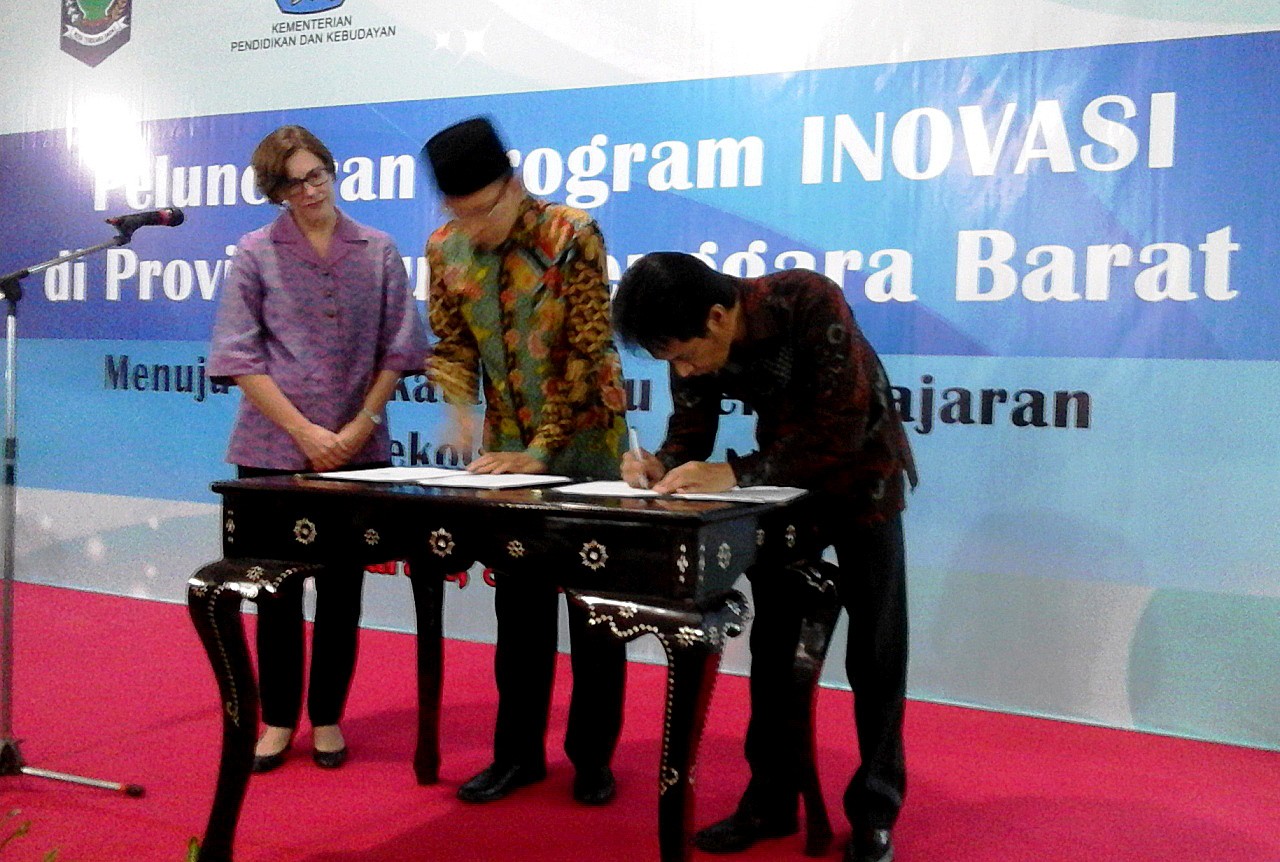Popular Reads
Top Results
Can't find what you're looking for?
View all search resultsPopular Reads
Top Results
Can't find what you're looking for?
View all search resultsIndonesia, Australia launch education program in W.Nusa Tenggara
Indonesia and Australia have agreed to cooperate in improving the quality of literacy and numerical skills of elementary school children in West Nusa Tenggara.
Change text size
Gift Premium Articles
to Anyone
 Better education – West Nusa Tenggara Governor Muhammad Zainul Majdi (center) and the Education and Culture Ministry research and development head Totok Suprayitno (right), sign an memorandum of understanding to mark the launch of the INOVASI program in Mataram on Wednesday evening. (thejakartapost.com/Panca Nugraha)
Better education – West Nusa Tenggara Governor Muhammad Zainul Majdi (center) and the Education and Culture Ministry research and development head Totok Suprayitno (right), sign an memorandum of understanding to mark the launch of the INOVASI program in Mataram on Wednesday evening. (thejakartapost.com/Panca Nugraha)
I
ndonesia and Australia have agreed to cooperate in improving the quality of literacy and numerical skills of elementary school children in West Nusa Tenggara.
Launched in Mataram on Wednesday evening, the Innovation for School Children (INOVASI) program will focus on raising the quality of literacy and numeracy at the elementary level in Indonesia.
West Nusa Tenggara Governor Muhammad Zainul Majdi and the Education and Culture Ministry’s head of research and development, Totok Suprayitno, signed a memorandum of understand (MoU) to mark the INOVASI program’s launch.
The Australian Embassy’s minister-counsellor for governance and human development, Fleur Davies, witnessed the signing of MoU ceremony, held at a meeting hall of the West Nusa Tenggara governor’s office in Mataram.
In the event, West Nusa Tenggara was named the first partner region of the INOVASI program, a partnership in the field of education between the Education and Culture Ministry and Australia’s Department of Foreign Affairs and Trade (DFAT), for the next four years.
Totok said education in Indonesia had been successful in allowing people greater access to its nine-year compulsory elementary education, from elementary school (SD) to junior high school (SMP), in almost all areas of the country. However, he said, the quality of education and learning outcomes were not yet equal across all regions.
“All Indonesian children have been able to access education at the elementary and junior high level. However, the type and quality of education is not the same. With the INOVASI program, it is expected that all Indonesian children can get good quality education, creating future generations that are not only properly educated but also have character,” said Totok.
He further said the INOVASI program would push schools, teachers and students to participate more actively in carrying out analyses and finding ideas to upgrade the quality of education, based on local content.
Toto said INOVASI program activities would be conducted in class rooms during teaching and learning interactions between teachers and students. The activities are hoped to strengthen the motivation of students for study.
Totok explained West Nusa Tenggara was chosen as an INOVASI pilot project area for the next four years, in which the program’s results would be adopted in other provinces in Indonesia.
Davies said the biggest challenge for Indonesia was to prepare next generations so they could become skilled and productive leaders and workers.
As Indonesia’s friend and neighboring country, Davies said the Australian government supported Indonesia in answering the challenge of addressing the quality of its education system for school-aged children. It was expected the newly launched INOVASI program could help the development of elementary and junior high students.
“Indonesia has made a big leap in the education sector, in which almost all school-aged children have an easier access to basic education services. Australia is proud to be able to contribute in the efforts,” said Davies.
She said at the national level, through the Indonesia-Australia partnership program in the education sector, the Australian government had assisted in building 1,155 junior high schools and 1,500 Islamic boarding schools, in a bid to improve the accreditation of the schools. In West Nusa Tenggara, 400 junior high schools were built under the partnership program.
“INOVASI will be focused to increase teaching and learning activities in class rooms. Teachers will find out what is needed to help improve the quality of literacy and numerical skills of elementary and junior high students [...],” said Davies.
The INOVASI program’s deputy chairman for development, Basilius Teko, said the Australian government had provided a A$49 million (US$36.5 million) grant to fund the program for the next four years.
He said the INOVASI program would run from the beginning of the 2016/2017 school year in 300 elementary and junior high schools in two regencies in West Nusa Tenggara.
“Currently, six regencies in the province have shown interest in the program, but we will choose two regencies, possibly Lombok Island and the other, Sumbawa Island,” said Basilius.
Based on a survey commissioned by the Education and Culture Ministry in 2013, West Nusa Tenggara is one province with very low elementary literacy and numeracy skills compared to other regions, reaching only 20 percent of satisfactory levels. The three other regions are East Nusa Tenggara, Maluku and Papua. (ebf)









